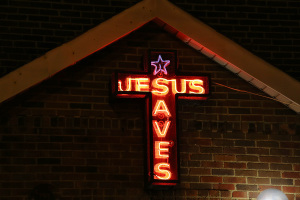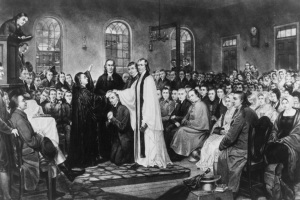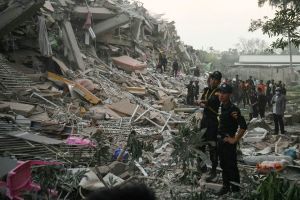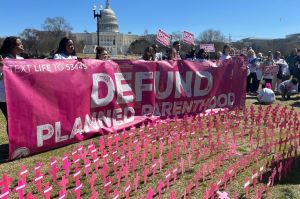South suffers deadly Easter Sunday as storm system of hail, tornadoes kills at least 18

At least 18 people are now dead and hundreds of homes were damaged after several states in the South, including the coronavirus-ravaged Louisiana and Mississippi, were battered Sunday and early Monday by a deadly storm system of hail and tornadoes.
As of Monday, 11 of the reported deaths resulting from the storm system came from Mississippi, The Mississippi Emergency Management Agency announced. Some 72,000 homes have also been left without power in the state.
Two of the 11 people killed came from Lawrence County. The local Sheriff’s Office identified the victims as Sherriff’s Deputy Robert Ainsworth and his wife, Paula.
“It is with heavy hearts that we announce the passing of Deputy Robert Ainsworth and his lovely wife, Paula. We, at the Lawrence County Sheriff’s Office, would like to offer our most sincere condolences to the families of both of these fine individuals,” the Lawrence County Sherriff’s Office announced in a statement on Facebook.
“Robert was a United States Marine Corps veteran and a long time employee here. Mrs. Paula was a former Justice Court Deputy Clerk at the Lawrence County Justice Court and currently a Justice Court Deputy Clerk for the Walthall County Justice Court. Robert left this world a hero, as he shielded Mrs. Paula during the tornado. He was a very valuable employee and will be greatly missed. Please remember to pray for LCSO along with their families during this tragedy. Rest in Peace, Brother. We have the watch from here. Job well done, Sir.”
Monticello Fire Chief Lyle Berard told CNN that two tornadoes reportedly hit the area.
"It's pretty bad," he said. "We have downed trees and multiple homes with major damage."
Mississippi Gov. Tate Reeves, who declared a state of emergency, lamented the deadly storm strike on Easter Sunday.
"My boy's house gone, man."
— ABC News (@ABC) April 12, 2020
Shocking footage shows significant damage done to homes in a neighborhood of Monroe, Louisiana after a suspected tornado tore through the area. https://t.co/TiQP7vbu28pic.twitter.com/nSVJAqsNAx
"This is not how anyone wants to celebrate Easter Sunday," Reeves said in a statement. "The state and our first responders are working around the clock and will not rest until this is over. We are mobilizing all resources available to protect our people and their property."
Candice Pitts told the network that she survived the storm in a small hallway at the Soso Volunteer Fire Station.
"All I had was my arms to put over my son and mother-in-law," she said. "Was near a solid glass door that blew out and the roof in many places tore off or collapsed. My car was park(ed) under a shed that is now blown over in a yard nearby. It's mangled."
According to the Weather Channel, there were more than 40 reports of tornadoes as the storms ripped through Texas and Arkansas, across Louisiana, Mississippi, Alabama and Georgia and into the Carolinas and Tennessee.
At least five people were killed when storms tore through a mobile home park near the Georgia-Tennessee border. One person in the Atlanta area died after a tree fell onto a home.
Mayor Jamie Mayo of Monroe, a city in north-central Louisiana of about 50,000 people, said hundreds of homes in his area were damaged by the storm.
“At least 200-300 houses have been damaged here in the city of Monroe alone," he told CNN. "We also have had damage throughout Ouachita Parish."
In statements on Twitter, Louisiana Gov. John Bel Edwards urged residents to stay home Sunday as the area remained on high alert for other systems emerging across the state.
“The images and reports of major tornado damage in the Monroe area are heartbreaking, and my prayers are with the people there. We are in contact with local officials in the area to provide support. I hope all of Louisiana is on high alert right now,” he said.
As coronavirus cases continue to climb in areas of the South like Louisiana, a Pew report Monday said the region will likely endure more death and economic loss from the deadly coronavirus, which has already killed more than 20,000 people in the U.S., more than any other region in the country.
The report said the impact of the coronavirus would likely be more devastating because of high poverty rates, weak social welfare programs and healthcare infrastructure and the area's high black population, which has emerged as a vulnerable demographic often plagued by underlying health conditions.





























